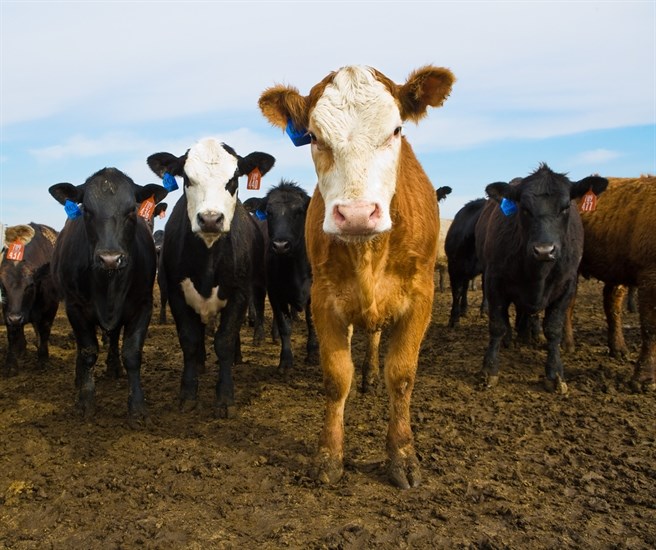
Cows are the future of wildfire prevention.
Image Credit: Shutterstock
May 31, 2019 - 6:30 PM
KAMLOOPS - B.C. Cattlemen's Association and the B.C. government are joining forces for a new endeavuor — using cows to combat wildfires.
The provincial government gave $500,000 to the B.C. Cattlemen's Association to put in place a preventive program in which herds of cattle will be strategically relocated to graze.
A practice that has been well known to cattle ranchers across the world has now been recognized as a sustainable, economical, and environmentally friendly way to help reduce the size and severity of wildfires.
The program is set to kick off this year, with the bulk of the benefits being seen in the years to come. Next week B.C. Cattlemen's Association will be meeting with the Ministry of Agriculture, B.C. Wildfire Service, and the Ministry of Forests, Lands, Natural Resource Operations, and Rural Development to begin identifying which areas within the province need the program implemented.
Kevin Boon, General Manager of B.C. Cattlemen's Association, claims that many ranchers homes and properties have been spared the devasting effects of wildfires thanks to their cattle. When cattle graze grassy areas, fires don't have the fine fuel that provides an opportunity to spread.
"It's a way of using what we have and what we're already doing in a way that doesn't cost a lot of money," Boon says.
The funding will be used to complete research, create infrastructure, clear land for grazing, and help with transport of the cattle to the designated grazing areas if need be.
"Once we get that infrastructure in place, then it'll be able to roll over from one year to the next, so it's a constant land management tool that we'll be able to do to protect some of these areas," says Boon.
The infrastructure could range from fencing to traditional herding, and even simple salt, mineral, and water trough placements.
"Typically cattle are not the most ambitious of creatures," Boon says with a laugh. "They find their water source and they'll graze the immediate area around that first, and they'll work their way out."
B.C. Cattlemen's Association will partner with local munipalities and First Nations communities to determine which land is most at risk, and open up those spaces for the herds to graze. The program will prioritize using local ranchers who are already grazing in the area, and adjusting their patterns. Ranchers will be able to go through a process to enlist in the program which will not only help reduce wildfires, but will also provide higher quality feed to their herds.
"We're not only protecting a community... in the meantime, we get to produce some really great tasting, high-quality protein, and we get to do it in a very environmentally sustainable way," Boon says.
Targetted grazing not only prevents wildfires and makes for better burgers, but it also has a strong impact on the soil quality.
Grazing has been known to create healthier soil, which in turn produces a quicker growth rate for grass and foliage.
"It will keep the soil in place so we don't see erosion after a fire in those hot burned areas, it will hold the land in place for water shed so we're actually able to enhance the ability to hold that water where it's supposed to be. The other aspect is it's creating a feed source for our livestock down the road. There's so many wins with doing this."
Boon is eager to share the many upsides of targetted grazing, but especially the unexpected benefits that come in the form of carbon sequestering. It is the process in which the ground holds carbon dioxide for long periods of time, which in turn helps to combat the rising temperatures brought on by climate change.
"The best way to get the roots working and storing carbon is to scar them a bit. When cattle graze, they actually wrap their tongue around the grass and pull it out, so that'll scar the roots a little bit. When you scar something it's no dfferent than when you get a cut on your skin. Your skin heals itself because the skin concentrates on that area. So when the root is scarred, the microorgansims concentrate on that scarred root to repair it. That gets all the biodiversity working in the soil so you're creating better, healthier soil while you're sequestering carbon."
Boon believes the program will bring many benefits to the province at a very low cost. Last year, $615 million was spent for wildfire suppression in the province.
"Half a million dollars is small potatoes," says Boon. "If you can stop a few fires, you've got it paid for."
He believes that the $500,00 will be able to go a long way for multiple years. The money was allocated to B.C. Cattlemen's Association partially through grants, which do not need to be used up by the end of the fiscal year. According to Boon, this means the money can be used wisely over time.
B.C. Cattlemen's Association will work at getting cattle out to grazing areas as soon as possible this year, and will begin the systematic grazing again next spring.
“If we do it right now, we're planning for the next fifty to 100 years.”
We welcome your comments and opinions on our stories but play nice. We won't censor or delete comments unless they contain off-topic statements or links, unnecessary vulgarity, false facts, spam or obviously fake profiles. If you have any concerns about what you see in comments, email the editor.
News from © iNFOnews, 2019